- Home
- Jeremy Robinson
Kronos Page 2
Kronos Read online
Page 2
Atticus stood barefoot on a barnacle-encrusted rock, one of many that formed a barrier between ocean and sand. Beyond the sand lay a man-made hump of sand and grass that guarded Route 1A and a row of homes built on the other side of the road, all facing the ocean, from storm waters. Atticus had often wondered if the homes had been erected prior to the high water-blocking sand piles—the ocean view was blocked for all but the tallest homes. But the misfortune of those few Rye residents living with obscured views was not enough to ease his distress.
The barnacles that cut into his rough feet failed to gain his attention.
A flock of frenzied seagulls pecking and squawking over the remnants of a dead skate washed in with the tide couldn’t pull Atticus from his thoughts.
Even the deep blue ocean, which sparkled like the most eloquently carved sapphire, failed to pull his mind from past to present.
“She’s dead,” the doctor said. “I’m sorry, but there was nothing we could do. The cancer was too much…too far…but you knew that already.”
Atticus nodded and looked out the Portsmouth Regional Hospital window, glimpsing the ocean on the horizon. “Are there any papers I need to sign?” His voice was as clinical as the doctor’s.
“No…no, of course not.”
“I can leave then?”
“Well…yes, but…Yes, of course.”
Atticus nodded and left his Maria’s bedside. A single thought echoed in his mind as he walked to the staircase, mindlessly descended two flights of stairs, and entered the main lobby.
My wife is dead.
My wife is dead.
Maria is…
Atticus burst into the men’s room, closed and locked the door behind him, and fell to the floor. His sobs could be heard beyond the reception desk, down the hall, and clear into the cafeteria. Even people in the rooms on the floor above could hear his anguish. That day, seventy-five people heard what it felt like to have a portion of one’s soul extinguished. Few of them could stop their own tears.
As the tears subsided, replaced by a blinding headache, Atticus’s awareness of his surroundings returned. The linoleum floor, pale white and sparkling clean, was cold on his palms. The air freshener, working hard to penetrate his running nose, smelled strongly of apple. The fluorescent light above buzzed gently, casting the room in dull blue. The sterility of it all helped calm his nerves and focus his mind.
Atticus stood on shaky legs, rinsed his face, and blew his nose. He knew that no amount of cold water could erase the redness and swelling his crying had brought to the flesh around his eyes, but it helped clear his mind. As Atticus left the bathroom and avoided the sympathetic eyes of the group gathered in the reception area, he put all his efforts into staying calm and reaching home safely. He couldn’t lose control again, because the hardest aftershock from Maria’s death was yet to come, and it would be his shoulders that carried the burden.
That was two years ago, and ever since, every morning when he woke up alone in bed, it was like being right back in that bathroom, cold and alone.
A sudden roar and a stab of frigidity on his feet finally returned him to the here and now. Atticus looked at his feet and found them covered to the ankles in water. The tide was coming in. As Atticus moved higher onto the rocky shore, he paused by a tide pool. His shadow fell over the ten-inch-deep puddle, shading it from the sun’s glare and allowing him to see scads of tiny creatures—crabs, shrimp, and snails—retreat to the shadows. The empty, glassy surface of the water only left one thing to look at, and it was by far the motliest sight in the tide pool.
Atticus examined the reflection of his face. Crow’s-feet had been carved into the skin around his eyes over the past ten years, but more severely in the last two. His hair, cut short, was simultaneously beginning to turn gray and recede. At only forty-one, he was beginning to look more like his father. His skin was still tanned dark brown, almost the same hue as his eyes, but the most distracting feature on his face was a long, scraggly beard that made him look more like a craggy sea captain than an oceanographer. He shook his beard and removed the few crumbs that had managed to cling since breakfast. They fell into the pool. A small, tan crab crawled out to inspect the sinking debris, snagged it, and retreated once more to the dark.
“Well,” Atticus said, “Hemigrapsus sanguineus, fancy meeting you here.”
Atticus thrust his hand into the pool like a diving osprey and snagged the little crab. He pulled his lightly clenched fist out of the water, dripping and containing the small arthropod. Cupping his hands together, Atticus inspected the little creature to confirm its identity—the Asian shore crab—an invasive species that had made landfall in New Jersey in 1988. Now, almost twenty years later, it inhabited the coast from Maine to the Carolinas. It competed with local crab species but also threatened the famous North American lobster. Just one of many invasions most people are unaware of that threaten the ocean’s ecosystem. True, the Asian shore crab might successfully replace the North American lobster in the food chain, substituting one animal for the other…but no one eats shore crab.
As Atticus looked the crab over, he knew he should crush the little thing before it could spawn and continue the invasion. But he didn’t have the heart. Killing wasn’t something of which he was capable, not anymore, even if it was an invasive species. He believed they should be wiped out and removed from the ecosystem, but not by his hands. He’d report the crab’s presence, and a crew would be sent out to find and kill every Asian shore crab in the area. It was a noble effort, but ultimately would prove futile.
Kind of like my work, Atticus thought. Atticus was in the business of wildlife preservation, but focused on the New England’s larger mammalian species, the humpback, minke, fin, and North Atlantic right whales, though he also worked with dolphins, seals, and, occasionally, sharks. He worked as an independent contractor for the New England Aquarium, the Whale Center of New England, and other independent scientific outfits, though most of his work and income went to the highest bidder, primarily the U.S. Navy, with which he still had close ties. His work could keep him at sea six months out of the year and often for weeks at a time, tracking, identifying, and tagging animals. His work for the military was often more discreet and required the signing of documents that guaranteed his silence, but it paid the bills and didn’t conflict with his environmental efforts.
But none of it mattered anymore. In a week, Rye and his work on the ocean would be a memory.
After placing the crab back in the tide pool, Atticus worked his way back through the rocks, the incoming tide nipping at his heels. He trudged through the shell-filled sand and walked over the top of the water barrier. At the apex he gazed at the long strand of houses with no view, and then slid down the hill on his heels. He reached his old red Ford Explorer, climbed in, and closed the door.
Atticus turned the ignition, and the SUV started with a roar. The dashboard clock glowed blue at him, reminding him of the time. He was going to be late. With a slow sigh, Atticus pulled off the side of the road and onto Route 1A, the memories of the past fading as anxiety for the future set in. Where he was going next would be the hardest part of his day. He had to tell Giona that they were moving in a week, to Ann Arbor. It was for the best, he knew, but he didn’t look forward to breaking his daughter’s heart…again.
3
Penobscot Bay, Maine—Thirty Miles Out
The ocean lay flat and placid, calm in a way so rarely seen in the waters off Massachusetts, New Hampshire, and Maine, collectively known as the Gulf of Maine. Jack Michaels leaned on the port rail of his fishing trawler, the Ragnarok, and wearily rested his chin on his hands. The herring season thus far had been abysmal, moving slower than the current four knots at which his ship was plodding along. It wasn’t that the fish weren’t there—other vessels were bringing in phenomenal hauls—but whether by some design of the sea or God’s working against him, the herring were avoiding the Ragnarok.
His eyes trailed from the slowly undulating seas to
the boat around him. The Ragnarok was ten years old, new by some standards, and carried a fresh coat of obsidian paint, giving her the look of a modern ghost ship. The look was reinforced by the myriad of dark sinew-like cables that stretched from various points on the ship to the trawler cranes, which were capable of pulling in tons of fish. The thick net dragged through the water kept the cables taut, ready to haul in the big catch.
Thus far they’d proved useless. For all the ship’s modern accoutrements, including a global positioning system and hydroacoustic fishfinders, the herring had remained elusive. If things didn’t pick up soon, he’d have to take out a loan to make his house payments and carry the business into the next year. If he didn’t pull in a great haul next year, he’d have to declare bankruptcy and go to work for one of the other fishing ventures…maybe head down to Essex, Massachusetts, where he grew up.
Jack considered the Ragnarok once again. Perhaps it was the ship’s gloomy visage that kept the fish at bay? He knew it wasn’t true, but this prime spot on the ocean, his personal secret, was devoid of fish, when it normally teemed with little silver bodies, swimming and swirling in unison. He sighed and removed a cigar from his jacket pocket. Usually reserved for the final successful haul, he felt there would be no use for it this year. Why not enjoy it now? After clipping the cigar and lighting up, he took a long drag, tasting the flavor, but quickly realized that without the success of a big haul, the cigar tasted more like burning dirt. He pulled the smoking cylinder from his cracked lips and looked at it. Its smell was suddenly noxious, and he moved to fling the thing out to sea.
“Captain!” The voice was so shrill and sharp that he almost fell overboard. Jimmy, the excitable new kid on the boat, was prone to overreacting…though his eyes had never looked quite so wide before. Jimmy stopped, put his hands on his knees, and, in between gulps of air, said, “They’re…coming!”
Jack crinkled his nose. The boredom was getting to everyone. “Who’s coming?”
“The—the herring! The hydroacoustics just picked them up.”
Captain Jack Michaels felt hope return. He straightened his stance and firmed his voice. “How many?”
“I have no idea…”
Jack sighed. The boy had been well trained to estimate the number of fish based on the information displayed by the fishfinder. Schools of herring often showed up as large masses of red, green, and blue speckles, and an astute mind could peg the number to within a hundred by gauging the width and length of the signature. But there was little time to scold the boy. He looked to the sky and found the telltale sign that the fish were coming. A flock of seagulls flew over the ocean, watching the waters below. Normally, the gulls would dive and pull fish from the sea, but this group looked as though they were having trouble keeping up. The herring were running. From what, Jack didn’t care. They were headed straight for the Ragnarok.
Bounding into the bridge, Jack took a look at the hydroacoustic display screen. At the bottom were two corresponding lines, one red, and one green. They marked the ocean floor. But it was the large cloud of colored specks that sucked the air from his lungs. The school of fish stretched almost all the way across the screen, with no end in sight. “Holy…” Jack snapped to his senses, issuing loud commands before he had given them any thought. “Drop the second net! Do it now!”
Not every trawler had a second net, but Jack had designed his boat to maximize efficiency. The secondary net was smaller than the first. It would catch a great number, but those that got around it were caught by the much larger secondary net. It was a secret that only he and his crew knew about, and it had greatly increased their catches in the past. Jack’s mouth spread in a wide smile. That day they would exceed the previous year’s catch…in mere minutes. It might take all day to pull the enormous catch from the nets, but the work would be worth it.
Jack could hear the shouts of his crew as they frantically dropped the second net. It spread in the water not a moment too soon. The front wave of herring, the truly fast specimens, hit the net and were scooped up. Then the front end of the mass of fish entered, and Jack actually felt the impact as tons of fish filled both nets. The Ragnarok slowed almost to a stop. Jack slammed the throttle forward. If the boat lost momentum, the fish might escape. The engines chugged loudly in response, groaning against the extra tons of weight, but eventually the boat picked up speed. Jack watched the hydroacoustic display as the cloud of herring thinned out and ended, the majority of the fish secure in the nets.
He was about to look away, let out a whooping cheer, and slap young Jimmy on the back, when a second object entered the display, hot on the heels of the remaining herring. But this wasn’t some speckled cloud of fish; it was solid. The object undulated into view, and as Jack estimated its size, he ruled out one creature after another.
Fifty feet…not the pilot, minke, or ray…
Sixty feet. He ruled out the humpbacks.
Seventy feet. Not a sperm whale, which had been his guess.
As the object continued to enter the viewfinder, he knew it was a blue whale. They grew to a maximum size of 110 feet. They were the largest living creature ever to grace the planet earth throughout its entire history. Nothing was bigger.
And yet, as this creature passed the 110-foot mark, then the 120-foot…140…150…he knew that the blue whale had been usurped as the ocean’s king. Jack suddenly realized the creature was coming for the herring and wasn’t slowing down. The Ragnarok would be obliterated. For a millisecond, Jack thought of ordering the nets cut loose, but it was too late. The behemoth had reached the nets, but at the last possible moment dived deep. It was amazingly agile for something so massive, and quicker than it had arrived, it disappeared from the hydrosonic display, as though it had never been.
Jack glanced to his side and saw Jimmy’s wide eyes and slack jaw. “Hell of a thing ain’t it, kid.”
Jimmy nodded. “Should…shouldn’t we tell someone?”
“Who would believe us?”
Cheers rose up from around the boat. Jack looked out the window and saw the ocean frothing with fish as the first net was brought up. The winches creaked under the strain, but were holding. It was the largest catch Jack had ever seen and that was only the first of two nets. Jack placed the cigar, which he’d been holding tightly the whole time, back in his mouth and took a puff. It tasted delightful.
He turned back to Jimmy. “The sea giveth and the sea taketh away. Just be thankful she was in a giving mood today and move on. Questioning things just invites trouble.” Jack nodded to the hydroacoustic screen. “And that kind of trouble is something we don’t want. Understand?”
Jimmy nodded.
“Good. Consider yourself promoted.” Jack opened the bridge door to a blast of fresh ocean air and the hoots and hollers of his gleeful crew, who, except for young Jimmy, would never know just how close they’d all come to being Hollywood’s next exploited sea tragedy. “All right,” Jack shouted, “get these fish on board double time! We’re heading home!”
The men cheered. They’d been at sea for weeks and missed their families. But a joyful homecoming wasn’t what spurred Jack’s urgency to get home. Rather, for the first time in his life, he wanted to get off the water and onto solid ground.
4
Portsmouth, New Hampshire
She knew the men behind her had been following closely for two blocks, maybe longer, mimicking every turn, every pause. Giona could smell the tobacco from the cigarettes they lit, three each in the last ten minutes. Probably nervous. She could also hear their shuffled footfalls on the centuries-old brick sidewalks. Portsmouth was an old town, one of the original East Coast ports and home of the Portsmouth Navy Yard—also home to sound-conductive sidewalks and a few less-than-honest residents.
She wasn’t sure exactly how long they’d been following her. She’d been engaged with her “inner voice,” as she liked to call her. It was her private devil’s advocate, conjured up by her mind when there was no one else to talk to, and had recently
become a mainstay in her thought processes. Some people might call it a conscience, but it only seemed to appear with certain subjects, and none were moral questions. While she totally disagreed with the opinions of her “inner voice,” it at least helped her firm up her opinions on issues she faced. She knew it was weird, but she didn’t have a ton of people to talk to.
Since her mom died, she’d rarely talked to anyone, including her father. He was nice enough. A good guy. Kind. Loving. Smart. She admired him and his work. Not all girls have an ex–Navy SEAL-turned-oceanographer for a father. But the day he’d come home from the hospital, eyes burnt red from crying, and just looked at her with those sad eyes, she knew two things. Her mother was dead, and she wouldn’t let herself get that close to anyone every again. Not even her father. And to let the world know to stay away, she changed everything about herself.
Her colorful wardrobe disappeared, replaced by black ill-fitting clothes purchased at the Salvation Army. She knew that might not be enough to keep everyone at bay, so she accentuated the black by dyeing her hair a variety of colors. The ridiculous number of silver bracelets on her wrists, the black-and-white-striped stockings she wore, and the piercings in her eyebrow, nose, and ears completed the look and achieved her desired goal: solitude. The only people inclined to spend any time with her were fellow recluses, who similarly had little use for close relationships.
Though she would never admit it, loneliness had become a problem; but she ignored it, fought against it, unwilling to suffer the loss that would eventually come. A few months ago, the “inner voice” had emerged. She knew the voice was slightly insane, borderline schizophrenic, but she didn’t care. It didn’t tell her to do things. Instead it spoke with her—argued with her, really—and oddly enough instilled a sense of peace in her; she wasn’t totally alone anymore. The one drawback was that she became oblivious to the outside world when arguing internally. She’d been distracted enough that the two guys had got within twenty feet of her and, if she hadn’t been snapped out of her thought processes by their overpowering odor, they could’ve snuck up right behind her with ease.

 Alter
Alter From Above - A Novella
From Above - A Novella Flux
Flux Tether
Tether Exo-Hunter
Exo-Hunter Pulse
Pulse Cannibal
Cannibal Omega: A Jack Sigler Thriller cta-5
Omega: A Jack Sigler Thriller cta-5 Flood Rising (A Jenna Flood Thriller)
Flood Rising (A Jenna Flood Thriller) Viking Tomorrow
Viking Tomorrow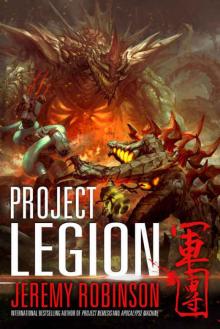 Project Legion (Nemesis Saga Book 5)
Project Legion (Nemesis Saga Book 5) BENEATH - A Novel
BENEATH - A Novel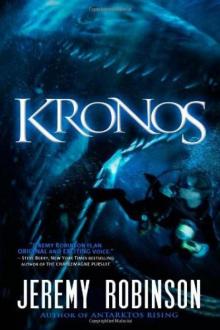 Kronos
Kronos SecondWorld
SecondWorld XOM-B
XOM-B Forbidden Island
Forbidden Island Project Maigo
Project Maigo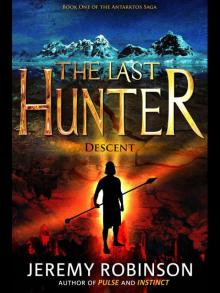 The Last Hunter - Descent (Book 1 of the Antarktos Saga)
The Last Hunter - Descent (Book 1 of the Antarktos Saga) Jack Sigler Continuum 1: Guardian
Jack Sigler Continuum 1: Guardian Infinite
Infinite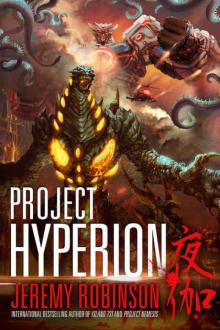 Project Hyperion
Project Hyperion The Distance
The Distance The Divide
The Divide The Last Hunter - Ascent (Book 3 of the Antarktos Saga)
The Last Hunter - Ascent (Book 3 of the Antarktos Saga) The Last Hunter - Pursuit (Book 2 of the Antarktos Saga)
The Last Hunter - Pursuit (Book 2 of the Antarktos Saga)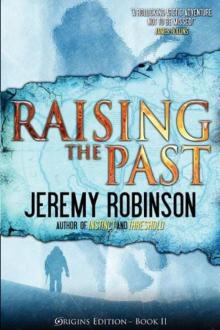 Raising the Past
Raising the Past The Others
The Others The Last Hunter - Collected Edition
The Last Hunter - Collected Edition Threshold
Threshold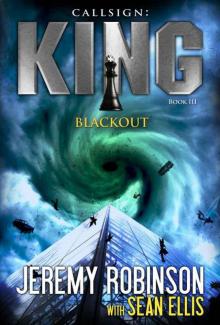 Blackout ck-3
Blackout ck-3 Antarktos Rising
Antarktos Rising Viking Tomorrow (The Berserker Saga Book 1)
Viking Tomorrow (The Berserker Saga Book 1) The Didymus Contingency
The Didymus Contingency Savage (Jack Sigler / Chess Team)
Savage (Jack Sigler / Chess Team) Prime
Prime Insomnia and Seven More Short Stories
Insomnia and Seven More Short Stories Empire (A Jack Sigler Thriller Book 8)
Empire (A Jack Sigler Thriller Book 8) Unity
Unity Instinct
Instinct The Last Hunter - Lament (Book 4 of the Antarktos Saga)
The Last Hunter - Lament (Book 4 of the Antarktos Saga) MirrorWorld
MirrorWorld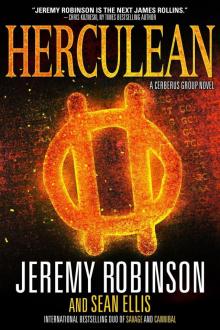 Herculean (Cerberus Group Book 1)
Herculean (Cerberus Group Book 1) Island 731
Island 731 Omega: A Jack Sigler Thriller
Omega: A Jack Sigler Thriller Patriot (A Jack Sigler Continuum Novella)
Patriot (A Jack Sigler Continuum Novella) 5 Onslaught
5 Onslaught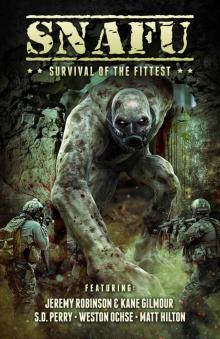 SNAFU: Survival of the Fittest
SNAFU: Survival of the Fittest Helios (Cerberus Group Book 2)
Helios (Cerberus Group Book 2)